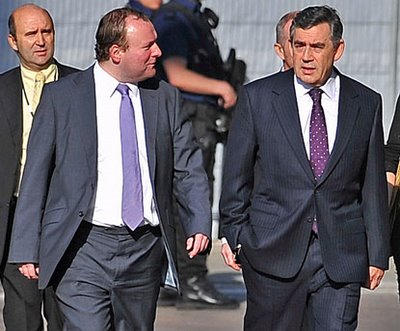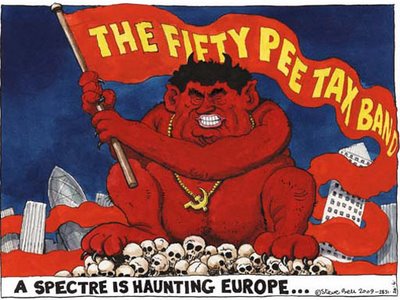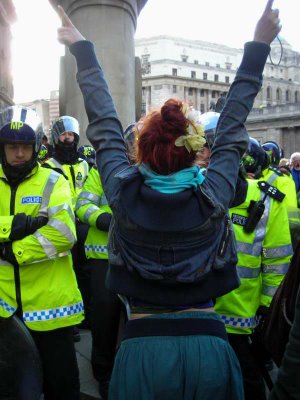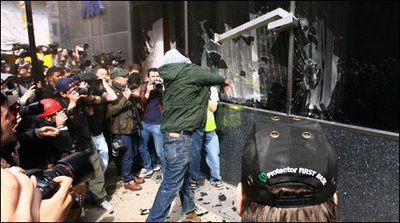 "Let's go to work."
"Let's go to work."
Probably the most ludicrous notion inspired by this faux outrage is that Labour could lose the next election because of it, and that the party has suffered "reputational damage" thanks to emails exchanged between a civil servant and a spin doctor handed the most poisoned chalice in current British politics. Labour will lose the next election because in the words of Roy Hattersley, the party is neither new enough nor Labour enough. Its one remaining claim to power was its economic record, a record which has since been flushed into the gutter. The only surprise of the last few months has been that the Conservatives have not built a bigger opinion poll lead, which is almost certainly down to just two factors: that the Tories' policies, those which they have, are only likely to make things worse; and that David Cameron has not yet sealed the deal with the electorate to the extent which Tony Blair did.
The other only slightly less ludicrous factor is the amount of sheer hypocrisy being exhibited by all of those involved. You would require a stomach of iron constitution not to feel sick at Staines describing the emails between Draper and McBride as "obscene"; this is the blogger who has variously implied that Mark Oaten was a paedophile, that routinely referred to the prime minister as the "prime mentalist", suggesting that he suffered from high functioning Asperger's syndrome without a scintilla of evidence and who has unmoderated comment fields where the invective and insults would be unfit to print on toilet walls. Staines' propaganda and self-promotion is that he provides the stories which the newspapers and "mainstream" media won't touch, but he is in fact as parasitical of them as any other blogger. The reality is that they give him stories and he gives them stories, all while claiming that he's about to blow the mainstream away. The sort of gossip and smears which are evident in the Draper/McBride emails is Staines' meat and drink, and he uses the old fallacy of urging those skewered to sue if his claims are false, hence the still unsubstantiated claims from him that John Prescott had an affair with Rosie Winterton, which you would have thought might have came out by now if it had happened.
At its heart, there is a fundamental lack of honesty from all those involved. The material which Staines acquired is the kind of gossip which most engage in, however untrue much of it is. Only last October there was the "scandal" involving George Osborne, Peter Mandelson and yachts, where we learned that Mandelson had dripped "poison" about Gordon Brown into the ears of his supposed political enemies. Osborne's error was to blab to others what Mandelson had told him; his comeuppance came when Mandelson revealed that Osborne might have attempted to obtain a donation from his host. The golden rule of all this is don't get fucking caught. These are not new developments; the briefing and counter-briefing is as old as politics itself. What is relatively recent is the venom with which the briefings are given, and that does originate with New Labour, although even John Major had his moments, such as his "bastards" comments. Both Brown and Blair surrounded themselves with such ardent followers that they would do almost anything to attack the other, hence we had Brown being described as "psychologically flawed" and it being put about that he was gay, while Mandelson, the master of the "dark arts", was himself smeared on various occasions. This is still continuing today, such was the rift created, hence Stephen Byers and Alan Milburn not hiding their satisfaction at McBride having to resign.
Again, if it wasn't so vomit inducing the Conservative response to this would be hilarious. Their attempts to pin this directly to Gordon Brown are understandable, although still repugnant. Yes, he kept McBride around, knowing full well what he was capable of and indeed what he had done in the past, but that he would have personally authorised the smearing of his opponents is nonsense. If anything, the Tories' efforts to paint themselves as completely above such tactics is setting them up for a fall in the same way as Labour did. Cameron has more or less done everything but pronounce himself a "pretty straight kind of guy" and that he will be "purer than pure". Let's be clear: if the Tories genuinely wanted to put an end to the age of spin, the very thing they would not have done is emulate Labour in appointing a former tabloid journalist as their chief media strategist. Say what you like about Alastair Campbell whilst he was in Downing Street, at least he never had to resign because of his journalism, or found himself accused of leading the bullying of those under him as Andy Coulson has. The Tories also know that they don't need to engage in such smearing to such an extent as perhaps they and their opponents have in the past: they now know they can rely on the likes of Staines and other malignant bloggers to do that for them. That those that can't write a sentence without using the word "cunt" or similar have been so celebratory over this "scandal" ought to tell you something about the sort of discourse which politics has now sunk to, which blogging has in many cases only made worse.
The only thing that has been got right by all involved is that Labour simply doesn't understand the internet and doesn't understand why it's so unpopular online. The broad reason is that those in government are always in opposition when it comes to the internet, as those opposed have more that unites them than unites the supporters, but the other main reasons are that the internet provides alternative voices not represented elsewhere, hence why libertarian blogs are so popular, and that British right-wing bloggers have taken their cue from the originators in America, like the Drudge Report. The Red Rag site which Draper was looking to set-up was meant to be an attempt to beat Staines at his own game, something which it was never going to achieve, and which also fails to understand that you have to fight gossip and intrigue not with more of the same, but with content and argument, which as Sunny points out is where the left in America succeeded. Draper's LabourList was an honourable attempt to do something similar, but was doomed to failure because Draper himself was involved, far too associated with the past and inextricably linked with the party itself. LabourList was and is simply not critical enough, while ConservativeHome, nicknamed Continuity IDS because of its to the right of Cameron stance, gets it right. Mr Eugenides recognises this, praising Liberal Conspiracy because it is the best attempt so far by the left to get organised and push things forward in a similar way to the American left. Its success is also though because while Labour supporters or sympathisers are contributors, it is completely independent of any party.
The biggest mis-step of all though was that Draper and McBridge imagined that those identified needed smearing. Nadine Dorries, after all, is possibly the biggest joke in British politics, and she has lied and mislead people on so many occasions that no one needs to make things up about her to show just how disreputable she is. Likewise, the idea that the public themselves will be turned off by such tactics is ignorant: they themselves call politicians every name under the sun, often quite deservedly, and the contempt in which they are held only continues to grow. You feel like telling all those involved to stop protesting so much whilst also suggesting that they get over themselves. This will be remembered not as another great New Labour scandal but yet another example of the Westminster bubble getting excited with itself while everyone else is just bemused and alienated.Labels: bloggocks, Conservatives, Damian McBride, Derek Draper, fall of Gordon Brown, Gordon Brown, Guido, Paul Staines, politics, smearing, spin








